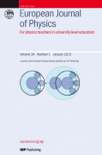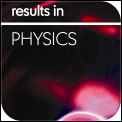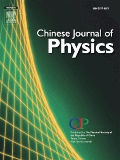
EUROPEAN JOURNAL OF PHYSICS
Scope & Guideline
Empowering Scholars with Rigorous Insights
Introduction
Aims and Scopes
- Condensed Matter Physics:
This area includes studies on the structural, electronic, magnetic, and optical properties of materials, particularly those related to silicon and its compounds, nanostructures, and various doping effects. - Plasma Physics and Magnetohydrodynamics:
Research focusing on plasma behavior in various contexts, including magnetohydrodynamics (MHD), with applications in astrophysics and engineering, is a significant focus of the journal. - Optoelectronics and Photonics:
The journal covers advancements in optoelectronic materials and devices, such as solar cells and photodetectors, emphasizing their physical properties and potential applications. - Theoretical Physics and Cosmology:
Theoretical studies related to cosmological models, dark energy, and quantum mechanics are prominent, showcasing mathematical modeling and simulations. - Nanotechnology and Materials Science:
Research on nanostructured materials and their applications in various technological fields, including energy storage and conversion, is increasingly emphasized. - Computational and Mathematical Physics:
The use of computational methods to solve complex physical problems, including simulations and modeling of physical systems, is a core aspect of the journal's publications.
Trending and Emerging
- Silicon-Based Technologies:
There is a significant increase in research focused on silicon and its compounds, particularly in applications related to electronics, photonics, and renewable energy sources. - Nanomaterials and Nanotechnology:
Emerging studies on nanostructured materials, their synthesis, characterization, and applications in various fields, including energy conversion and storage, are gaining prominence. - Magnetohydrodynamics (MHD) in Engineering Applications:
The application of MHD principles in engineering contexts, particularly in fluid dynamics and thermal management, is an increasingly popular research area. - Quantum Computing and Information Science:
Research in quantum mechanics applied to computing and information technologies is growing, reflecting the importance of quantum phenomena in modern physics. - Interdisciplinary Approaches to Physics:
There is a noticeable trend towards interdisciplinary research that combines physics with biology, chemistry, and environmental science, emphasizing the importance of collaborative studies.
Declining or Waning
- Classical Mechanics:
While classical mechanics remains foundational, recent publications indicate a waning interest in purely classical studies, as researchers increasingly focus on quantum and relativistic effects. - Traditional Nuclear Physics:
Research specifically focused on nuclear interactions and traditional nuclear physics has seen a decrease, possibly due to a shift towards more applied nuclear technology and interdisciplinary approaches. - Elementary Particle Physics:
There has been a noticeable reduction in studies related to the fundamental aspects of particle physics, likely overshadowed by applied physics and material science advancements. - Static Materials Studies:
Research centered around static properties of materials without considering dynamic or environmental factors is becoming less frequent, reflecting a broader interest in real-world applications and behaviors.
Similar Journals

Lithuanian Journal of Physics
Cultivating a Community of Physics InnovatorsWelcome to the Lithuanian Journal of Physics, an esteemed publication helmed by the Lithuanian Physical Society, dedicated to advancing the field of physics and astronomy. Established in 2008 and continually publishing insightful research through 2024, this journal aims to provide a platform for high-quality scholarly articles that contribute to the understanding of various physical phenomena. With a steady presence in the academic landscape, the journal is currently ranked in the fourth quartile of the Physics and Astronomy category and is positioned at the 18th percentile in its Scopus ranking, reflecting its niche focus and accessibility for researchers and students alike. Although currently not operating under an open access model, the journal remains a vital resource for professionals seeking to stay informed on the latest developments in the field. The Lithuanian Journal of Physics invites contributions that inspire collaboration and innovation in physical sciences, making it an invaluable resource for the global scientific community seeking to expand knowledge within this dynamic field.

PRAMANA-JOURNAL OF PHYSICS
Pioneering Insights into the Physical UniversePRAMANA-JOURNAL OF PHYSICS, published by the esteemed Indian Academy of Sciences, serves as a pivotal platform for disseminating high-quality research in the field of Physics and Astronomy. Established in 1973, this journal aims to promote significant findings in various branches of physics, encapsulating both theoretical and experimental research. With a solid reputation reflected in its Q2 ranking in the Physics and Astronomy (miscellaneous) category and a commendable 94/243 rank in the Scopus database, PRAMANA stands at the forefront of the academic community. Researchers, professionals, and students benefit from its accessible compilation of innovative studies, contributing richly to the scholarly discourse. The journal, operating from its base in Bangalore, India, is committed to advancing knowledge through rigorous peer-reviewed articles, ensuring that all contributions hold merit in expanding our understanding of the physical world.

Results in Physics
Fostering Collaboration, Inspiring BreakthroughsResults in Physics, an esteemed open-access journal published by ELSEVIER, has been a prominent platform for disseminating cutting-edge research in the field of physics since its establishment in 2011. With its ISSN 2211-3797 and E-ISSN 2211-3797, this journal proudly holds a Q2 ranking in the Physics and Astronomy category for 2023, showcasing its significance and quality within the scientific community. With a remarkable Scopus rank of #28 out of 243 in the general physics and astronomy domain, placing it within the 88th percentile, Results in Physics serves as a vital resource for researchers, professionals, and students alike, fostering a collaborative environment for the advancement of knowledge across various subfields. The journal aims to provide a rapid and unrestricted access to innovative findings, encouraging open scientific dialogue and enhancing the visibility of breakthrough research. Located in the Netherlands at RADARWEG 29, 1043 NX AMSTERDAM, Results in Physics continues to uphold its commitment to excellence and accessibility in the ever-evolving landscape of physics research.

Frontiers of Physics
Pioneering Discoveries in the Realm of PhysicsFrontiers of Physics, published by Higher Education Press, is a premier open-access journal dedicated to fostering innovative research and excellence within the field of physics. With an ISSN of 2095-0462 and an E-ISSN of 2095-0470, this rapidly growing journal has established itself as a valuable platform for disseminating cutting-edge findings, covering a diverse range of topics from theoretical frameworks to experimental advancements. Notably, Frontiers of Physics has achieved an impressive Q1 ranking in the 2023 Scopus Quartiles for Physics and Astronomy, securing a competitive 5th out of 81 positions in its category, reflecting a high impact factor that underscores its importance to the scientific community. Since its inception in 2011 and continuing through 2024, the journal aims to bridge the gap between academia and industry, encouraging collaboration among researchers, professionals, and students alike. Its commitment to open access ensures that high-quality research is readily accessible, thereby promoting knowledge sharing and advancement in the global physics community. Explore the potential of your research in Frontiers of Physics, where the future of physics flourishes.

CHINESE JOURNAL OF PHYSICS
Catalyzing Innovation in the World of PhysicsCHINESE JOURNAL OF PHYSICS is a distinguished publication in the field of physics, published by Elsevier. With its roots in Taiwan, this journal has been a vital platform for disseminating innovative research findings since its convergence in 1996, and it continues to thrive, with articles contributing to the advancement of physics and astronomy until 2024. The journal is recognized for its high quality, achieving a notable Q2 ranking in the Physics and Astronomy category, positioning it among the top 30 out of 243 journals in its field, reflecting an impressive 87th percentile ranking. Although it does not operate under an open access model, the journal offers valuable insights into the latest trends and developments in general physics and astronomy, making it an essential resource for researchers, professionals, and students dedicated to advancing their knowledge and understanding of these dynamic fields. With a commitment to rigorous peer review and a diverse range of articles, the CHINESE JOURNAL OF PHYSICS is instrumental in fostering collaboration and innovation within the global scientific community.

REVISTA MEXICANA DE FISICA
Advancing Physics Education and Research in Mexico and BeyondREVISTA MEXICANA DE FISICA is a prominent academic journal dedicated to advancing knowledge in the fields of Physics and Education. Published by the SOC MEXICANA FISICA, this journal plays a pivotal role in disseminating innovative research and educational methodologies from Mexico and beyond. With a publication history that spans from 1991 to 2024, it has established itself as an essential resource for researchers, professionals, and students who seek to deepen their understanding of general physics and astronomy. The journal is classified in the Q3 quartile in both education and physics & astronomy, showcasing its quality and relevance within the academic landscape. While the journal currently operates on a subscription basis, it provides a valuable platform for emerging voices and established scholars alike. By fostering a collaborative environment for scientific discourse, REVISTA MEXICANA DE FISICA continues to be an important channel for the ongoing evolution of scientific education and exploration in the physical sciences.

Physics, published by MDPI, is an open-access journal that commenced in 2019 and has quickly established itself as a significant contributor to the field of physics and astronomy. With a respectable impact factor and categorized in the Q2 quartile for 2023, this journal serves a broad spectrum of topics within the discipline, fostering innovative research and insights. As part of the MDPI portfolio, known for promoting high-quality, peer-reviewed research, Physics aims to provide a platform for scholars, professionals, and students to publish their findings and engage with contemporary debates in the field. The journal's accessibility, paired with its commitment to scientific excellence, ensures that research is readily available to a global audience, which is crucial for advancing knowledge and collaboration in physics. Located in the heart of Switzerland at ST ALBAN-ANLAGE 66, CH-4052 BASEL, the journal enjoys a position at the nexus of cutting-edge research and academia.

Romanian Journal of Physics
Advancing the frontiers of physics and astronomy.Welcome to the Romanian Journal of Physics, a distinguished platform dedicated to advancing the field of physics and astronomy since its inception. Published by EDITURA ACAD ROMANE, this journal plays a pivotal role in disseminating high-quality research from Romania and around the globe, with an impressive impact factor that reflects its rigorous academic standards. With a focus on a broad range of topics in general physics and astronomy, it proudly maintains a Q2 ranking in its category for 2023, positioning itself among the top journals in the field. The journal, which has been converging valuable research contributions from 2008 until 2024, is accessible to a wide audience of researchers, professionals, and students interested in the latest developments and discoveries in physics. While it operates under a traditional publication model without Open Access, its commitment to quality research ensures that the contributions featured in its pages resonate well within the scientific community. We invite you to explore the rich findings published in the Romanian Journal of Physics and to engage with the vital discussions shaping the future of physics.

Recent Contributions to Physics
Advancing knowledge in the world of physics.Recent Contributions to Physics is a distinguished journal published by AL-FARABI KAZAKH NATIONAL UNIVERSITY, focusing on the latest developments and research breakthroughs in the field of physics. Established as an open access journal since 2008, it aims to facilitate the wide dissemination of knowledge by allowing researchers, professionals, and students worldwide to access high-quality content without barrier. Featuring a diverse range of topics within physics, from theoretical innovations to practical applications, this journal is an essential resource for anyone seeking to stay at the forefront of scientific advancement. Its commitment to quality and accessibility not only enhances the impact of research in the scientific community but also promotes collaboration across disciplines. With its dedication to fostering a vibrant academic dialogue, Recent Contributions to Physics is poised as a key contributor to the future of physics research.

Ukrainian Journal of Physics
Unveiling New Discoveries in Physics and AstronomyUkrainian Journal of Physics, published by the Bogolyubov Institute for Theoretical Physics of the National Academy of Sciences of Ukraine, stands as a significant platform for the dissemination of research in the dynamic field of physics. With its ISSN 2071-0186 and E-ISSN 2071-0194, the journal aims to foster academic dialogue and innovation among researchers, professionals, and students alike. Recognized with a Scopus ranking that places it in the 26th percentile, the journal offers an array of contributions spanning various domains, including general physics and astronomy. Although currently categorized in the Q3 quartile for 2023, it seeks to elevate its scholarly impact while providing open access to its contents, facilitating wider availability and engagement. With a commitment to publishing high-quality research from 2007 to 2024, the journal embraces interdisciplinary approaches to physics, making it an invaluable resource for anyone dedicated to advancing their understanding and exploration of physical sciences.